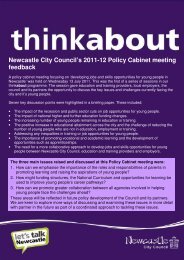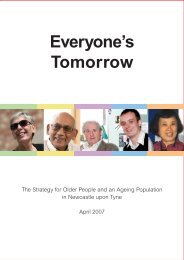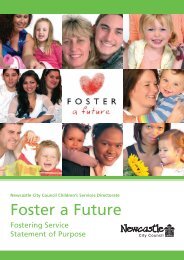Seeing Newcastle through young people's eyes - Newcastle City ...
Seeing Newcastle through young people's eyes - Newcastle City ...
Seeing Newcastle through young people's eyes - Newcastle City ...
You also want an ePaper? Increase the reach of your titles
YUMPU automatically turns print PDFs into web optimized ePapers that Google loves.
Agenda Item 3<strong>Seeing</strong> <strong>Newcastle</strong> <strong>through</strong> Young People’s EyesPolicy Cabinet – Briefing Paper, 11 September 2013Summary• To really understand <strong>Newcastle</strong> <strong>through</strong> <strong>young</strong> people’s <strong>eyes</strong> it was important that <strong>young</strong>people wrote this briefing paper – a first for policy cabinet!• <strong>Newcastle</strong> Youth Council were tasked with preparing the briefing paper and the Septembermeeting – not an easy task considering there are 67,400 children and <strong>young</strong> people aged 0-19living in <strong>Newcastle</strong> – that’s a lot of pairs of <strong>eyes</strong>!• We tried to gather as many <strong>young</strong> people’s views as possible: this report draws on our previouswork; results of a Call for Evidence; as well as a postcard survey that we carried out• We don’t share all of the findings in this report but look in detail at five key areas for furtherdiscussion, debate and actionWe explore1. Does the current PHSE and Citizenship Curriculum prepare <strong>young</strong> people to be Ready ForLife?2. Things to do and places to go for <strong>young</strong> people: are these dependent upon where you live, youraccess to the city centre and the amount of financial resources in your family?3. Is it good that we are a party city? What message does this send to <strong>young</strong> people? Can <strong>young</strong>people access the city centre at night? What are the alternatives?4. Do <strong>young</strong> people have a future in <strong>Newcastle</strong>? Or will most of us leave <strong>Newcastle</strong> if we can toaccess education, jobs and opportunities elsewhere?5. Finally, how can we work together better to make sure <strong>young</strong> people are part of the solution tothe problems facing <strong>Newcastle</strong> and work closely with partners to think of new ideas and takerisks to find alternative solutions?Page 11
<strong>Newcastle</strong> Youth Council<strong>Newcastle</strong> Youth Council is an independent Youth Council, supported financially by<strong>Newcastle</strong> <strong>City</strong> Council, working in partnership with Children North East which providesday to day management. The Youth Council also works in conjunction with various otherorganisations regionally, nationally and internationally. The Youth Council decides its ownpriorities however and is run by <strong>young</strong> people aged 11-18.The Youth Council is an elected body of 28 members. The current membership waselected in October 2012 with 5,579 votes cast and represent <strong>young</strong> people from all parts ofthe city. The Youth Council took office on the 4 th November 2012 and will serve a two yearterm.<strong>Newcastle</strong> Youth Council aims to make <strong>Newcastle</strong> a better place for <strong>young</strong> people bylistening to them, getting their voices heard and acted on. It acts as a critical friend todecision makers and seeks to work with them to improve life for <strong>young</strong> people whilstretaining the ability to act independently.What did we do?<strong>Newcastle</strong> <strong>City</strong> Council tasked us with preparing a Policy Cabinet meeting to specificallylook at <strong>Newcastle</strong> <strong>through</strong> Young People’s Eyes. There are 67,400 children and <strong>young</strong>people living in <strong>Newcastle</strong> aged 0-19 years old, which is a lot of pairs of <strong>eyes</strong>! Wetherefore tried to gather views from as many children and <strong>young</strong> people in <strong>Newcastle</strong> aspossible to inform this report.We gathered together all of the work we have done since becoming Youth Councillors.This includes: our consultation with 433 <strong>young</strong> people on the <strong>City</strong> Council’s BudgetProposals 2013-2014 ‘A Fair Deal for Young People’; our survey of 157 <strong>young</strong> peopleexploring their experience of the curriculum ‘Ready For Life?’; as well as findings fromworkshops on issues such as <strong>young</strong> people’s experiences of policing.We are also aware that there are a lot of excellent organisations working with <strong>young</strong>people across <strong>Newcastle</strong> who are routinely seeking <strong>young</strong> people’s views and activelyinvolve <strong>young</strong> people in their decision making. We therefore issued a call for evidenceand invited youth organisations to submit any reports, research or <strong>young</strong> people’s viewsgathered over the past 12 months. We would like to say thank you to the organisationswho submitted evidence:• Benfield School Council• Children North East• Communities Team, <strong>Newcastle</strong> <strong>City</strong> Council• Mental Health North East• <strong>Newcastle</strong> Youth Service• Voices for Choices• West End Youth Enquiry Service• Your Homes <strong>Newcastle</strong>, Youth Independence ForumPage 22
We also sought to gather the views of <strong>young</strong> people who don’t access any youthorganisations or groups. We produced a postcard that asked two simple questions: ‘Whatis good about being a <strong>young</strong> person in <strong>Newcastle</strong>’? And ‘How could it be better’? Wegave these out to our peers in school and college. We also stood in the centre of<strong>Newcastle</strong> on two separate occasions and asked <strong>young</strong> people to share with us theirviews. We received 477 completed postcards in response.We also read facts and figures about <strong>Newcastle</strong> and <strong>young</strong> people to help make sense ofall of the information.We spent a full day reading <strong>through</strong> the information and sorting the issues into themes. Asyou can imagine there is too much information to present in a summary to Policy Cabinet.We have written a more comprehensive report which gives more details and all of ourfindings. Please contact <strong>Newcastle</strong> Youth Council if you would like a copy.What we are presenting here is a summary of the strongest themes that emerged as afocus for further discussion and debate.1. Ready For Life?Ready for Life is a campaign launched by <strong>Newcastle</strong>Youth Council, to develop the way in which PHSEand Citizenship Education is delivered in schools.Ensuring <strong>young</strong> people leave schools with relevantlife skills is one of the Youth Council’s priority areasfor action. As <strong>young</strong> people we currently feel thatPHSE and Citizenship Education do not cover all ofthe issues that school leavers need to equip themwith the necessary life skills.We believe that there needs to be more within thecurriculum to develop: <strong>young</strong> people’s sex andrelationship education; finance skills and sustainableliving; political knowledge and citizenship education;preparation for work; and, better work experience.“I strongly feel that politicaleducation and financialeducation are extremelyimportant as they are one ofmany important subjects thatmost certainly will help us in life.Yet we are not getting taughtthem”“We should be taught moreabout managing our livesoutside of academic education”We surveyed 157 <strong>young</strong> people to find out how they currently experience the curriculum.We also sought the views of PHSE and Citizenship staff too. We are also working closelywith the UK Youth Parliament and their Curriculumfor Life Campaign on a national level - recentlysubmitting written and oral evidence at the BritishYouth Council, Youth Select Committee.We found pupils often had different views to their“Young people need to be taughtthe basic skills of how to be anadult, how to pay bills etc”Page 33
teachers about the importance and relevance of the curriculum to their lives - with teachersfeeling it is more relevant than pupils. Evidence from our survey was saddening with only38.6% of students reporting that they are taught about ‘credit or debit cards’ or ‘how towrite a CV’, despite 83.7% saying they would like these in the curriculum. Only 9.6% saidthey were taught about getting on the Housing Ladder; 27.2% about taxes and 18.4%about National Insurance. The same was true of subjects within health and politicaleducation.Ready For Life? Survey ResponsesThere was also a difference in opinion about who is best placed to deliver the subjects,teachers or outside agencies with a specialism? 41.5% of pupils felt teachers should beinvolved in delivering PHSE and Citizenship Education and 30% felt that teachersshouldn’t be involved. 62% of pupils said they would like an outside agency involved inteaching the curriculum and only 8% felt theywould not.Ready for Life? Survey Responses.For a full copy of the report contact <strong>Newcastle</strong>Youth Council.Our findings were backed up by a report carriedout by Ofsted published in May 2013 which foundthat “the quality of PSHE education is not yet goodenough in a sizeable proportion of schools inEngland”. The report contains some worryingfindings such as:• Lack of high-quality, age-appropriate sexand relationships education in more than athird of schools is a concern as it may leavechildren and <strong>young</strong> people vulnerable toinappropriate sexual behaviours and sexualexploitation• One third of respondents to the online“Sex and relationship educationis the only subject that should bedelivered by an outside agencywhile others may be delivered bya teacher if lessons are preparedto a much better standard to theones that I have experienced”“Young people advising other<strong>young</strong> people in schools e.g.Feedback groups, get to knoweach other, life advice fromexperience. Teachers are oftenuninspired to give the advice, soa professional or other student issometimes better as they havethe expertise, experience orcare”survey wanted to learn how to deal with mental health issues such as coping withstress, bereavement and eating disorders• Too many teachers lacked expertise in teaching sensitive and controversial issues,which resulted in some topics such as sexuality, mental health and domesticviolence being omitted from the curriculum• In 80% of primary and secondary schools, outside speakers made a valuablecontribution by bringing a wide range of expertise and life experiences to the PSHEeducation programme1. Questions to discuss/Action to take1a Does our curriculum currently equip <strong>young</strong> people with the necessary life skills?1b What skills are needed for the future economy in the North East?Page 44
1c1d1eAre teacher’s best placed to deliver the curriculum?Where does the expertise lie in <strong>Newcastle</strong> around health and sex education,political and financial education that can support our schools?Will any schools in <strong>Newcastle</strong> work with <strong>Newcastle</strong> Youth Council to pilot andinnovate new approaches and curriculum materials?2. Things to Do, Places to Go Vs. Poverty and CostsThe range of things to do and places to go was what <strong>young</strong> people told us they both likedabout <strong>Newcastle</strong>, as well as what they wanted more of. As a Youth Council we felt thiswas because we were seeing <strong>Newcastle</strong> <strong>through</strong> a range of <strong>young</strong> people’s <strong>eyes</strong>. If youhave money you can enjoy a lot more of what <strong>Newcastle</strong> has to offer and can take upmore opportunities.Most <strong>young</strong> people felt that the dispersion of things to do across the city was unevenlybalanced; the centre of town offers activities such as shopping, skateboarding, stadiums tosee football matches or go to concerts, cinemas to see mainstream and more indie films,as well as free museums to appreciate art and culture and greens to just hang out. Butmore suburban areas had fewer things to do. <strong>Newcastle</strong> Youth Council interpreted this asthere being fewer youth clubs or sporting activities around. Some <strong>young</strong> people statedthat they wanted somewhere inside to just “sit and hang out 1 ”Young people had concerns about the reduction in funding to many of the opportunitiesthat they relied upon and wanted more, rather than less, to be available. Both during andafter the budget cuts survey, <strong>young</strong> people described the cuts as having a negative impacton opportunities to do things in <strong>Newcastle</strong>.One thing became apparent from our surveys;although most <strong>young</strong> people visit the same venuesor hang out in similar places, each <strong>young</strong> person hasan individual experience from <strong>Newcastle</strong> dependingon their background or their neighbourhood. In 2011,the charity Children North East stated that 132,000children in the North East are living in poverty, with“Nothing to do and have nomoney”“Nothing to do except annoypeople”Benfield Youth Council56% of <strong>young</strong> people in Byker alone living in poverty. How can the cost of doing things in<strong>Newcastle</strong>, as well as the cost of travelling into the centre, keep rising and the council notexpect these <strong>young</strong> people to be detrimentally affected by this? During a time of lessresources and increasing gaps between the wealthy and the poor, it’s crucial that thecouncil ensure free, safe places for <strong>young</strong> people to go and cheap activities for them to doin their own neighbourhoods, so that <strong>young</strong> people can have rich experiences in their livesregardless of financial resources within their families or where they live.1 ‘Consultation postcard’ responsePage 55
2. Questions to discuss/Action to take2a Do <strong>young</strong> people experience <strong>Newcastle</strong>differently depending on how much moneythey have?2b How can we ensure all <strong>young</strong> people have thesame entitlements to recreation andopportunities?2c How can we ensure <strong>young</strong> people have richexperiences on offer and can pursue theirinterests, regardless of the financial resourceswithin their family?2d How can we do this during a time of lessresources?“Too much violence – usually todo with drinking”“Not 100% safe in town onnights out”Your Homes <strong>Newcastle</strong>, YouthIndependence Forum“Get rid of drinking”Postcard response3. Drink & NightlifeIt is a common opinion among <strong>young</strong> people in <strong>Newcastle</strong> that drinking and night life is animportant part of the city. From as <strong>young</strong> an age of 12 or 13, <strong>young</strong> people told us theythink <strong>Newcastle</strong> has a good night life.<strong>Newcastle</strong> is a city which attracts people to visit to party, be it on hen or stag weekends.Every Thursday, Friday and Saturday night at least, districts around The Gate (where<strong>young</strong> people enjoy going to the cinema and eating in the various restaurants) and nearCentral Station are thriving with clubbers, sometimes drunk and rowdy. What messagedoes this send <strong>young</strong> people about how they shouldhave fun and spend their recreation time in<strong>Newcastle</strong>?Young people also shared their concerns aboutfeeling safe in the city centre at night.In schools, it is common for people as <strong>young</strong> as 15to be admitted into clubs by “dressing older” andtherefore enjoy “cheap booze”. Young people areoften desperate to grow up and act older. Howeverwith no shops or cafes open past 7:00pm, there areno alternatives to “being out” in <strong>Newcastle</strong> at night other than go to pubs or clubs anddrink. Could there be alternatives to having a good time, such as later opening hours forsome cafes, or even the opening of youth cafes in the centre of town. For example byoffering them an alternative, this would ensure that16 year olds and older can safely be taught aboutlooking after themselves at night - a crucial life skill -and possibly even dim the appeal of illegally drinkingin town until they are of age.What’s good about living in<strong>Newcastle</strong>? - “Living in a partycity”How could it be better? - “Dropthe drinking age”Postcard’ response from male,age 13“Love that it’s a party city! I likethe bars”Your Homes <strong>Newcastle</strong>, YouthIndependence ForumPage 66
















